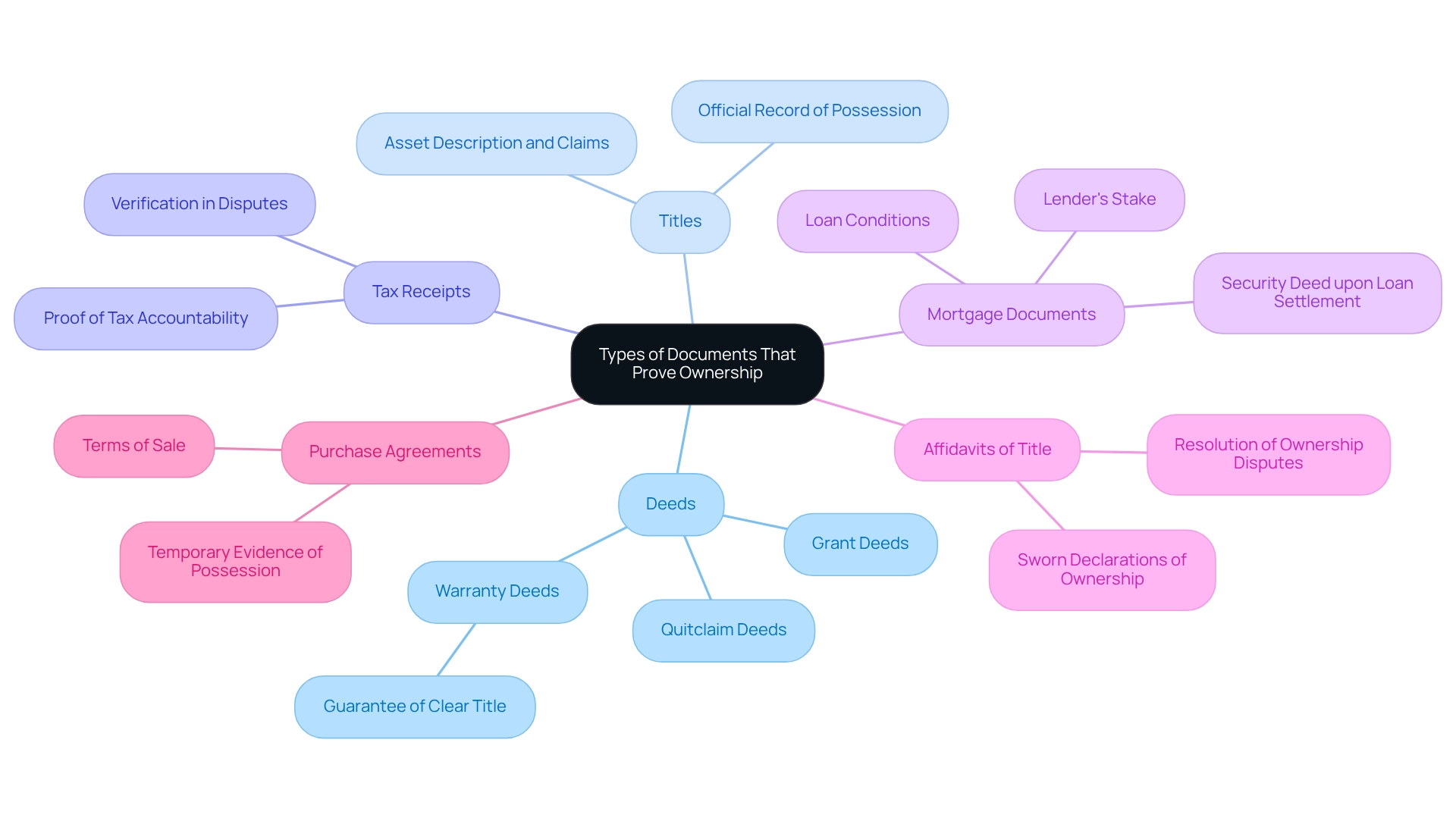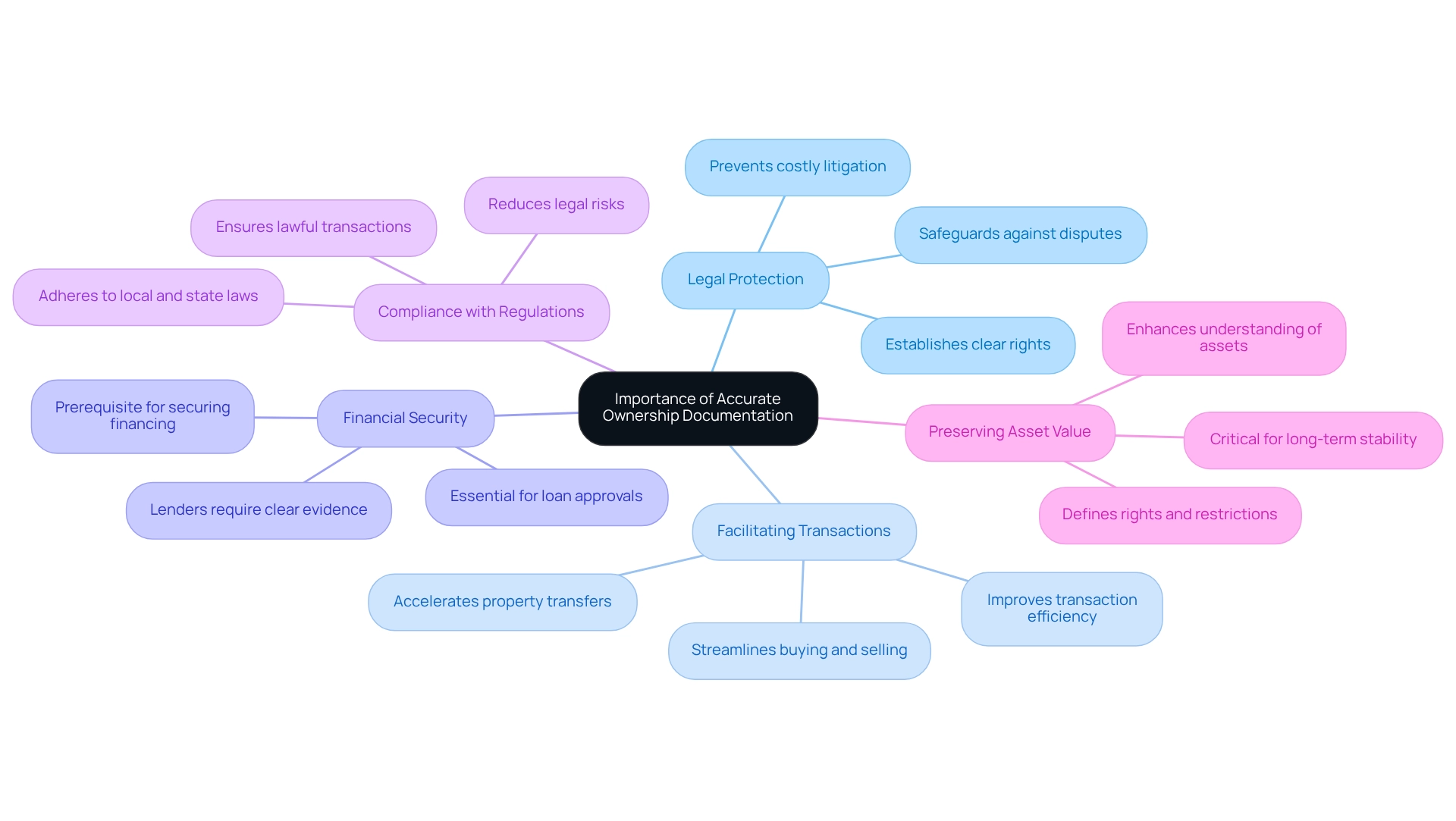Overview
Property ownership is established through essential documents such as deeds, titles, tax receipts, and mortgage documents, each fulfilling a distinct function in affirming legal possession. This article underscores the critical nature of these documents, highlighting their necessity in:
- Facilitating real estate transactions
- Ensuring legal protection
- Maintaining accurate records
Such measures are vital in preventing disputes and financial complications, thereby reinforcing the integrity of property ownership.
Introduction
In the intricate realm of real estate, the importance of property ownership documents is paramount. These legal instruments not only affirm the rights of individuals or entities to specific pieces of real estate but also form the foundation of real estate transactions. From deeds and titles to various contracts, a comprehensive understanding of these documents is essential for anyone engaged in buying or selling property. Notably, a staggering percentage of real estate disputes stem from unclear ownership records, underscoring the necessity for precise documentation.
Furthermore, as technology advances, innovative solutions are emerging to tackle the challenges of property ownership verification, thereby ensuring the integrity of transactions is upheld. This article explores the different types of ownership documents, the obstacles encountered in proving ownership, and the critical importance of maintaining accurate records in the dynamic landscape of real estate.
Define Property Ownership Documents
Property titles are that indicate for an individual or entity concerning a specific piece of real estate. These documents not only provide evidence of possession but also help in real estate transactions. The most common types of property include deeds, titles, and various contracts that delineate the transfer of rights.
For instance, a deed is a formal record that transfers ownership from one party to another, while a title signifies the rightful claim to possess and utilize the property; therefore, understanding what documents prove property ownership is crucial for all parties involved in real estate, as these documents provide the foundational basis for claims and facilitate the buying and selling process.
Recent statistics indicate that approximately 30% of real estate disputes arise from ambiguous title documentation, which emphasizes what documents prove property ownership and underscores the importance of maintaining accurate and comprehensive records. Expert opinions stress that thorough validation of property documentation can prevent costly legal complications and enable smoother transactions.
As noted by Laura Ingalls Wilder, 'Home is the nicest word there is,' which highlights the emotional and legal significance of having a residence. Furthermore, case studies such as '' demonstrate how the integration of machine learning and optical character recognition can address the challenges of verifying land rights, ultimately fostering trust and transparency in the market.
In conclusion, are not mere formalities; they are . are encouraged to enhance their online content and engage with more clients through innovative strategies, reflecting the evolving landscape of .
Types of Documents That Prove Ownership
Multiple important records validate asset possession, each fulfilling a unique role:
- Deeds: A that enables the transfer of possession from one party to another. The most common , each tailored for specific circumstances in the transfer process. For instance, warranty deeds provide a guarantee of clear title, while quitclaim deeds transfer any interest the grantor may have without warranties.
- Titles: A title is an official record that denotes possession of an asset, outlining the asset’s description and any burdens or claims against it. Titles are and are frequently reviewed during deals to ensure there are no unresolved matters.
- Tax Receipts: These papers act as proof of possession by showing that the holder is accountable for taxes on the asset. They are frequently required to verify possession status, particularly in disputes or when applying for loans.
- Mortgage Documents: In instances where an asset is financed, . They detail the conditions of the loan and the lender's stake in the asset, which is crucial for both the borrower and the lender. Once the loan is settled, the lender issues , providing the borrower complete ownership of the property.
- Affidavits of Title: These sworn declarations confirm the possession of real estate and can be crucial in legal matters. They provide a declaration of the owner’s rights and can help resolve disputes regarding ownership.
- Purchase Agreements: These contracts outline the terms of sale and can serve as temporary evidence of possession until the deed is officially recorded. They are essential in the transaction process, ensuring that both parties comprehend their rights and responsibilities.
It is important to understand what documents prove , as they are crucial for potential buyers and real estate experts alike, establishing the basis for property verification. is frequently suggested to navigate the complexities related to these documents, ensuring that all possession options are thoroughly examined. As Robert Moore advises, consulting with legal professionals before entering into any real estate transaction is prudent.
Furthermore, in Georgia, once a deed is registered with the county clerk’s office, it becomes part of the public record, enabling anyone to access these records to confirm asset rights. Additionally, the significance of risk evaluation in real estate can be demonstrated through case studies, such as those provided by Anderson Business Advisors, which offer insights into financial and asset protection strategies for business proprietors.

Challenges in Proving Property Ownership
Proving property ownership presents several significant challenges that must be navigated effectively:
- Incomplete Records: A considerable number of assets face complications due to incomplete or absent documentation, complicating the establishment of a clear chain of title. Notably, statistics indicate that real estate has generated greater profits than all industrial investments combined, highlighting the to facilitate wealth accumulation.
- Discrepancies in Information: Variations in names, property descriptions, or terminology can incite confusion and disputes regarding possession. Real estate attorneys frequently emphasize that even minor discrepancies can lead to , underscoring the importance of meticulous record-keeping. Moreover, as noted by the GAO, understanding can serve as valuable tools for research and other potential applications, emphasizing the need for thorough verification processes.
- Title Defects: Complications arise from issues such as liens, easements, or claims from previous owners, which can obscure the verification of property rights. These to identify what documents prove property ownership and resolve legitimate possession. The case study titled "" exemplifies how Parse AI effectively addresses these challenges by employing machine learning and optical character recognition to extract information from title documents, thus enabling title researchers to complete abstracts and reports with enhanced speed and accuracy.
- Legal Complexities: Navigating the legal implications of various possession structures—such as joint tenancy or tenancy in common—can be daunting for individuals unfamiliar with real estate law. Insights from real estate lawyers reveal that is essential for ensuring compliance and clarity in asset management.
- Fraudulent Claims: The threat of forgery or deceitful documentation poses a serious risk to legitimate entitlement claims. The increase in instances of fraud emphasizes the necessity for and verification processes to safeguard against such risks.
Addressing these challenges is imperative for real estate professionals, as the integrity of asset verification directly influences investment decisions and overall market stability.
Importance of Accurate Ownership Documentation
Accurate property documentation is essential for several key reasons, particularly in determining :
- : Legal protection is essential as it relies on [what documents prove property ownership](https://lawfirm.com/real-estate/statistics), safeguarding asset holders against disputes and claims by clearly establishing rights. This legal clarity is vital in preventing costly litigation and ensuring peace of mind.
- : Accurate records significantly streamline the buying and selling process. They allow all parties engaged to confirm possession swiftly, thus accelerating property transfers and improving overall transaction efficiency.
- : Clear title documentation is a prerequisite for securing financing. Lenders demand clear evidence of property status, specifically what documents prove property ownership, before authorizing loans, making precise records essential for potential purchasers seeking financial assistance. For example, with the average home down payment in 2021 being $27,850, the stakes involved in real estate transactions emphasize the necessity of having accurate ownership documentation to facilitate loan approvals.
- Compliance with Regulations: Maintaining precise records is essential for adhering to local and state regulations. This adherence reduces the risk of legal issues and guarantees that real estate transactions are carried out within the limits of the law.
- Preserving Asset Value: Accurate documentation plays a vital role in maintaining asset value. By clearly defining rights and restrictions, it helps ensure that all aspects of the asset are understood, which is critical for long-term investment stability.
As businesses increasingly embrace documentation practices and automation tools, they unlock new levels of efficiency and success, further highlighting the importance of in the real estate sector. Case studies, like those featuring DocuPhase's productivity tools, demonstrate how improve the precision and efficiency of documentation processes, highlighting the tangible advantages of careful record-keeping. Financial experts consistently emphasize that understanding what documents prove property ownership directly impacts property value, reinforcing the necessity of . Looking ahead, embracing documentation will be crucial for transforming business operations in 2025 and beyond.

Conclusion
The significance of property ownership documents is paramount in the real estate landscape. These vital legal instruments, including deeds, titles, and contracts, serve not only as proof of ownership but also as the backbone of real estate transactions. The prevalence of disputes stemming from unclear ownership records underscores the urgent need for accuracy and transparency in documentation. By comprehensively understanding the various types of ownership documents and the challenges associated with proving ownership, stakeholders can adeptly navigate the complexities of real estate.
Accurate ownership documentation provides essential legal protection, facilitates smoother transactions, and secures financial stability. It safeguards property owners against disputes, streamlines the buying and selling process, and ensures compliance with regulations. Furthermore, with the integration of technology and innovative solutions, such as machine learning and automation tools, the industry is evolving towards more efficient and secure documentation practices.
As the real estate market continues to grow and change, the importance of maintaining precise property ownership records will only increase. Embracing meticulous documentation practices is not merely a recommendation; it is a necessity for anyone involved in real estate. Ensuring clarity and accuracy in ownership records will foster trust, enhance transaction efficiency, and ultimately contribute to a more stable and prosperous real estate environment.
Frequently Asked Questions
What are property titles?
Property titles are legal instruments that indicate the documents proving property ownership for an individual or entity concerning a specific piece of real estate.
What types of documents prove property ownership?
The most common types of property title documents include deeds, titles, and various contracts that delineate the transfer of rights.
What is the difference between a deed and a title?
A deed is a formal record that transfers ownership from one party to another, while a title signifies the rightful claim to possess and utilize the property.
Why is understanding property ownership documents important?
Understanding what documents prove property ownership is crucial for all parties involved in real estate, as these documents provide the foundational basis for claims and facilitate the buying and selling process.
What percentage of real estate disputes arise from ambiguous title documentation?
Approximately 30% of real estate disputes arise from ambiguous title documentation.
How can thorough validation of property documentation benefit real estate transactions?
Thorough validation of property documentation can prevent costly legal complications and enable smoother transactions.
What role does technology play in verifying land rights?
The integration of machine learning and optical character recognition can address the challenges of verifying land rights, ultimately fostering trust and transparency in the market.
What is the significance of property title records in real estate?
Property title records are vital for establishing and preserving the integrity of real estate transactions, not mere formalities.




